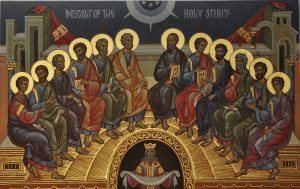Pentecost - June 9, 2019
Sunday, June 9, is the Christian holy day of Pentecost. The name comes from the Greek word pentekoste which means fiftieth. The holiday is celebrated on the seventh Sunday after Easter which is also fifty days after Easter, hence the name. Since its date depends on the date of Easter, Pentecost is a moveable feast, that is, the date is not fixed. It commemorates the descent of the Holy Spirit on the Apostles and other followers of Jesus Christ while they were in Jerusalem celebrating the Feast of Weeks. This important event in the Christian faith is described in the Acts of the Apostles (Acts 2:1–31), the fifth book of the New Testament of the Bible.

In Eastern Orthodox Christianity, Pentecost can refer to the entire fifty days of Easter through Pentecost. Pentecost is also called "White Sunday" or "Whitsunday." In the United Kingdom, traditionally, the next day, Whit Monday, was also a public holiday. In Germany, Pentecost is called "Pfingsten" and often coincides with the beginning of many outdoor and springtime activities. These include festivals and organized outdoor activities by youth organizations. The Monday after Pentecost is a legal holiday in many European nations.
Learn more with the books below:
If there's a particular celebration you or someone you know participates in that we missed, let us know by leaving a comment on this post. Or, if you think we got something wrong, please also comment and let us know. We try to be as accurate as possible, but if there's a mistake, we want to correct it.


Add a comment to: The Origins and Practices of Pentecost